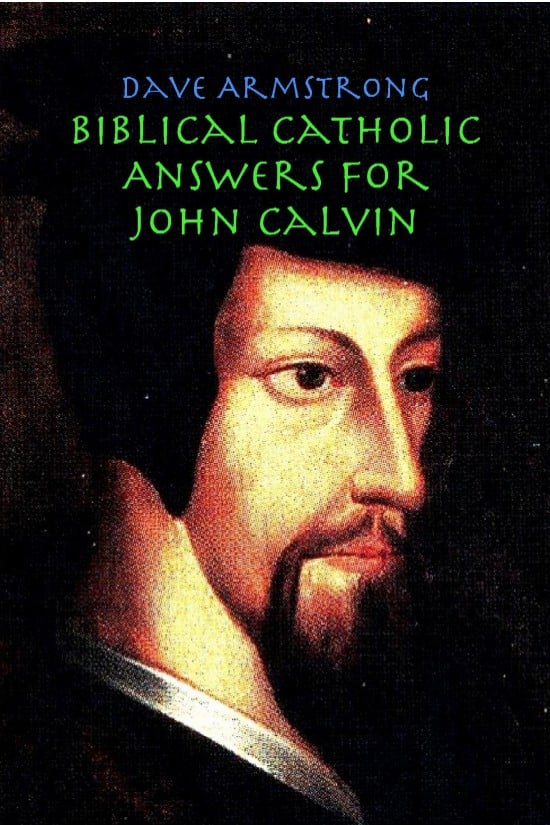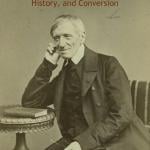
John Calvin (1509-1564) was the second most important leader in the earliest days of Protestantism, and arguably, even more historically influential, in terms of theology, than its founder, Martin Luther.
Citations from Institutes of the Christian Religion (abbreviated as “Inst.) were translated by Henry Beveridge for the Calvin Translation Society in 1845, from the 1559 edition in Latin; reprinted by Wm. B. Eerdmans Publishing Co.: Grand Rapids, Michigan, 1995, and available for free online.
*****
1) The One True Church (Infallible? & Indefectible) / Councils & Bishops / Roman Primacy
To those to whom he is a Father, the Church must also be a mother. (Inst., IV, 1:1)
Beyond the pale of the Church no forgiveness of sins, no salvation, can be hoped for, . . . the abandonment of the Church is always fatal. (Inst., IV, 1:4; cf. 1:20)
To prevent the truth from perishing in the world, the Church is its faithful guardian, because God has been pleased to preserve the pure preaching of his word by her instrumentality . . . (Inst., IV, 1:10)
But if the holy prophets felt no obligation to withdraw from the Church on account of the very numerous and heinous crimes, not of one or two individuals, but almost of the whole people, we arrogate too much to ourselves, if we presume forthwith to withdraw from the communion of the Church, . . . (Inst., IV, 1:18)
I always hold that the truth does not perish in the Church . . . (Inst., IV, 9:13)
When any doctrine is brought under discussion, there is not a better or surer remedy than for a council of true bishops to meet and discuss the controverted point. There will be much more weight in a decision of this kind, to which the pastors of churches have agreed in common after invoking the Spirit of Christ, than if each, adopting it for himself, should deliver it to his people, or a few individuals should meet in private and decide. (Inst., IV, 9:13)
While we are unwilling simply to concede the name of Church to the Papists, we do not deny that there are churches among them. (Inst., IV, 2:12)
I deny not that the early Christians uniformly give high honour to the Roman Church, and speak of it with reverence. . . . pious and holy bishops, when driven from their sees, often betook themselves to Rome as an asylum or haven. . . . It therefore added very great authority to the Roman Church, that in those dubious times it was not so much unsettled as others, and adhered more firmly to the doctrine once delivered, as shall immediately be better explained. . . . she was held in no ordinary estimation, and received many distinguished testimonies from ancient writers. (Inst., IV, 6:16)
2) Baptismal Regeneration & Other Agreements Regarding Baptism / Sacramentalism
At whatever time we are baptised, we are washed and purified once for the whole of life. Wherefore, as often as we fall, we must recall the remembrance of our baptism, and thus fortify our minds, so as to feel certain and secure of the remission of sins. . . . it is not abolished by subsequent sins. (Inst., IV, 15:3)
. . . forgiveness, which at our first regeneration we receive by baptism alone . . . we are washed from our sin. (Inst., IV, 15:4)
The first access to God, the first entrance to immortal life, is the remission of sins. . . . our cleansing in baptism. (Inst., IV, 16:3)
God, regenerating us in baptism, . . . (Inst., IV, 17:1)
[Calvin also thought that Catholic baptism was valid (IV, 15:16), which is why he, like Luther, never got rebaptized; that it initiates us into the Church as children of God (IV, 15:1; 16:9; 17:1; 18:19) and unites us to Christ (IV, 15:6); that infant baptism is valid, by the analogy to circumcision (IV, 16:11) and Jesus welcoming children (IV, 16:7); that immersion isn’t necessary (IV, 15:19); and that sacraments nourish, strengthen, and sustain us, and increase our faith (IV, 14:7, 9, 12, 19), and are tied to salvation itself (IV, 18:19). He thought ordination was a sacrament (IV, 14:20; 19:31). And he approved of a rite of confirmation, very much like ours, presided over by a bishop, though he didn’t call it a sacrament (IV, 19:4, 6), and for “the presbyters of the Church to be called to anoint the sick” (Inst., IV, 19:18)]
3) Apostolic Succession
For neither are the light and heat of the sun, nor meat and drink, so necessary to sustain and cherish the present life, as is the apostolical and pastoral office to preserve a Church in the earth. (Inst., IV, 3:2)
All ecclesiastical officers may be properly called apostles, because they are all sent by the Lord and are his messengers . . . pastors (except that each has the government of a particular church assigned to him) have the same function as apostles. (Inst., IV, 3:5)
Such is the sacred, inviolable, and perpetual law, enjoined on those who succeed to the place of the apostles,—they receive a commission to preach the Gospel and administer the sacraments. (Inst., IV, 3:6)
4) Necessity of Good Works / Sanctification Organically Connected to Justification
A man is justified freely by faith alone, and yet that holiness of life, real holiness, as it is called, is inseparable from the free imputation of righteousness. That repentance not only always follows faith, but is produced by it, ought to be without controversy . . . it is certain that no man can embrace the grace of the Gospel without retaking himself from the errors of his former life into the right path, and making it his whole study to practice repentance. (Inst., III, 3:1)
The gift of good works . . . shows that we have received the Spirit of adoption. (Inst., III, 14:18)
Our last sentence may refute the impudent calumny of certain ungodly men, who charge us, first, with destroying good works . . . The allegation is that justification by faith destroys good works. . . . that when faith is so highly extolled, works are deprived of their proper place. But what if they are rather ennobled and established? We dream not of a faith which is devoid of good works, nor of a justification which can exist without them: . . . This faith, however, you cannot apprehend without at the same time apprehending sanctification; . . . whom he justifies he sanctifies. But as the question relates only to justification and sanctification, to them let us confine ourselves. Though we distinguish between them, they are both inseparably comprehended in Christ. . . . you cannot possess him without being made a partaker of his sanctification: for Christ cannot be divided. . . . he bestows both at once but never the one without the other. Thus it appears how true it is that we are justified not without, and yet not by works, since in the participation of Christ, by which we are justified, is contained not less sanctification than justification. (Inst., III, 16:1)
Nor must we hence assume a license of sinning for the future . . . Those who, from hopes of impunity, seek a license for sin, only provoke the wrath and justice of God. (Inst., IV, 15:3)
5) Eucharist: Real Presence (?) & Salvation
There are some who define the eating of the flesh of Christ, and the drinking of his blood, to be, in one word, nothing more than believing in Christ himself. But . . . we are quickened by the true partaking of him, which he designated by the terms eating and drinking, lest any one should suppose that the life which we obtain from him is obtained by simple knowledge. (Inst., IV, 17:5)
I am not satisfied with the view of those who . . . only make us partakers of the Spirit, omitting all mention of flesh and blood. As if it were said to no purpose at all, that his flesh is meat indeed, and his blood is drink indeed; that we have no life unless we eat that flesh and drink that blood; . . . (Inst., IV, 17:7)
The very flesh in which he resides he makes vivifying to us, that by partaking of it we . . . are reared to eternal life. (Inst., IV, 17:8)
Who sees not that the communion of the flesh and blood of Christ is necessary to all who aspire to the heavenly life? (Inst., IV, 17:9)
The true and substantial communication of the body and blood of the Lord, . . . are received not by the imagination or intellect merely, but are enjoyed in reality as the food of eternal life. (Inst., IV, 17:19)
The corporeal presence which the nature of the sacrament requires . . . secures the immortality of our flesh, . . . (Inst., IV, 17:32)
[Calvin also thought that partaking of Holy Communion presupposed “unity in true doctrine” (IV, 1:7), that those “polluted with malice and wickedness” ought not partake (IV, 17:40), and that “no meeting of the Church is held without . . . the dispensation of the Supper, . . . (IV, 17:44); i.e., “at least once a-week” (IV, 17:43; cf. 46); in other utterances he talks about a mystical presence, which may or may not be contradictory to the above statements; that’s why I added the question mark]
6) Penance, Absolution, Indulgences, & Excommunication
There were, moreover, solemn rites, which, as indications of repentance, were wont to be prescribed to those who had lapsed. (Inst., IV, 12:6)
Pastors . . . exhort the people . . . to other exercises of humiliation, repentance, and faith, . . . left to the judgment of the Church. (Inst., IV, 12:14)
I will speak briefly of the rite of the early Church, . . . By the order observed in public repentance, those who had performed the satisfactions imposed upon them were reconciled by the formal laying on of hands. This was the symbol of absolution by which the sinner himself regained his confidence of pardon before God, and the Church was admonished to lay aside the remembrance of the offence, and kindly receive him into favour. [an indulgence] . . . I consider that ancient observance of which Cyprian speaks to have been holy and salutary to the Church, and I could wish it restored in the present day. (Inst., IV, 19:14)
This was the method observed by the ancient and purer Church, . . . When the penitent had thus made satisfaction to the Church, he was received into favour by the laying on of hands. [this is an indulgence: the relaxation of temporal punishment for sin] (Inst., IV, 12:6)
The discipline of excommunication . . . has been committed to the Church. Now, the Church binds him whom she excommunicates, not by plunging him into eternal ruin and despair, but condemning his life and manners, and admonishing him, that, unless he repent, he is condemned. (Inst., IV, 11:2; cf. 12:2)
Excommunication . . . although it also punishes, it is to bring him to salvation, by forewarning him of his future doom. (Inst., IV, 12:10)
7) Perpetual Virginity of Mary
The word brethren, it is well known, is employed, in the Hebrew language, to denote cousins and other relatives. (Commentary on John [2:12])
Under the word brethren the Hebrews include all cousins and other relations, whatever may be the degree of affinity. (Commentary on John [7:3])
It is said that he did not know the Virgin until she had given birth to her first Son. By this the Evangelist signifies that Joseph had not taken his wife to live with her, but to obey God, and to fulfill his duty towards him. It was not therefore for carnal love, nor for profit, nor for anything else that he took his wife: but it was in order to obey God, . . . Now there have been some fantastic [other translations: strange, crazy] people who have wanted to gather from this passage that the virgin Mary had had other children than the Son of God, and that Joseph had then afterwards lived with her: but this is madness.
For the Evangelist did not want to recite what had happened afterwards: he only wants to declare the obedience of Joseph, . . . he deprived himself of a wife. He could marry another, since he could not enjoy the woman he had married: but he preferred to leave his right, and abstain from marriage (being nevertheless married), . . . than to look at what would have come to his pleasure. He forgot all these things, in order to submit himself fully to God. And besides, our Lord Jesus Christ is called the first born. Not that there was a second or a third: . . . Scripture speaks thus, of calling the first born, although there is no second. We see therefore the intention of the Holy Spirit: and yet, to addict ourselves to these foolish subtleties, would be to abuse the Holy Scripture, . . . when men are thus fretful, and their ears are ticklish to call for new speculations, it is necessary that the devil possesses them so much that they harden themselves, . . . they maintain their errors and dreams with a diabolical obstinacy. (Sermon 22 on Matthew 1:22-25, in Corpus Reformatorum, Vol. 74: John Calvin: All the Works That Remain [Opera Quae Supersunt Omnia], Vol. 46, pp. 259-272; probably dated between 1559-1561; translated from the French by means of Google Translate)
[Note: some Calvinists deny with insufficient reason that Calvin held this view. Thomas Henry Louis Parker, author, editor, or translator of numerous volumes about or by Calvin, states in his book, Calvin: an Introduction to his Thought (Westminster John Knox Press, 1995), that “Calvin holds . . . the perpetual virginity of Mary” (p. 66). The article “Mary” (by David F. Wright) in the Encyclopedia of the Reformed Faith (edited by Donald K. McKim, Westminster John Knox Press, 1992), proclaims that he “undoubtedly favored it” (p. 37). The Second Helvetic Confession (1564: Reformed) and notes in the Geneva Bible (1560), the primary Bible of English Calvinists, held to it as well. According to Calvin’s successor, Theodore Beza (1519-1605), Catholics and Protestants agreed on the perpetual virginity of Mary at the Colloquy of Poissy in 1561, within Calvin’s lifetime]
8) Lenten-Like Fasting & Abstinence
When manifestations of the divine anger appear, as pestilence, war, and famine, the sacred and salutary custom of all ages has been for pastors to exhort the people to public fasting and extraordinary prayer. (Inst., IV, 12:14)
A holy and lawful fast has three ends in view. We use it either to mortify and subdue the flesh . . . , or to prepare the better for prayer and holy meditation; or to give evidence of humbling ourselves before God, when we would confess our guilt before him. (Inst., IV, 12:15)
Whenever supplication is to be made to God on any important occasion, it is befitting to appoint a period for fasting and prayer. (Inst., IV, 12:16)
But there is another temporary fast, when we retrench somewhat from our accustomed mode of living, either for one day or a certain period, and prescribe to ourselves a stricter and severer restraint in the use of that ordinary food. This consists in three things—viz. the time, the quality of food, and the sparing use of it. By the time I mean, that while fasting we are to perform those actions for the sake of which the fast is instituted. For example, when a man fasts because of solemn prayer, he should engage in it without having taken food. The quality consists in putting all luxury aside, and, being contented with common and meaner food, . . . In regard to quantity, we must eat more lightly and sparingly, only for necessity and not for pleasure. (Inst., IV, 12:18)
They slept on the ground, their drink was water, their food bread, herbs, and roots, their chief luxuries oil and pulse. From more delicate food and care of the body they abstained. . . . By such rudimentary training they prepared themselves for greater offices. . . . it appears that pious men were wont to prepare for the government of the Church by monastic discipline, that thus they might be more apt and better trained to undertake the important office . . . (Inst., IV, 13:8)
9) Holy & Sacred Places
It was inconsiderate in Xerxes when. . . he burnt or pulled down all the temples of Greece, because he thought it absurd that God, to whom all things ought to be free and open, should be enclosed by walls and roofs, as if it were not in the power of God in a manner to descend to us, that he may be near to us, and yet neither change his place nor affect us by earthly means, but rather, . . . raise us aloft to his own heavenly glory, which, with its immensity, fills all things, and in height is above the heavens. (Inst., IV, 1:5)
10) Opposition to the Contraceptive Mentality / Procreation the Purpose of Marriage
I will contend myself with briefly mentioning this, as far as the sense of shame allows to discuss it. It is a horrible thing to pour out seed besides the intercourse of man and woman. Deliberately avoiding the intercourse, so that the seed drops on the ground, is double horrible. For this means that one quenches the hope of his family, and kills the son, which could be expected, before he is born. This wickedness is now as severely as is possible condemned by the Spirit, through Moses, that Onan, . . . tore away the seed of his brother out [of] the womb, and . . . tried to destroy a part of the human race. When a woman in some way drives away the seed out the womb, through aids, then this is rightly seen as an unforgivable crime. (Commentary on Genesis [38:10], 1563; translated by John King)
*****
NOTE: see the video in which I discuss this article: Calvin’s Strikingly Catholic Views: Ten Catholic Truths John Calvin Embraced!!! [with Kenny Burchard, Catholic Bible Highlights, 1 hr, 28 minutes, 2-13-25], and also my related article, Martin Luther’s Ten Important “Catholic” Views (2-2-25) and the corresponding video with Kenny Burchard, that discusses these points and adds additional information: Luther’s Shocking Catholic Confessions: Ten Catholic Truths Martin Luther Embraced!!! [Catholic Bible Highlights, 2-6-25]
*
***
*
Photo credit: self-designed cover of my self-published book (2010) [see book and purchase information]
Summary: I collect statements of the Protestant “reformer” John Calvin (1509-1564) in ten different areas where he either agrees with Catholic positions or comes remarkably close to them.













